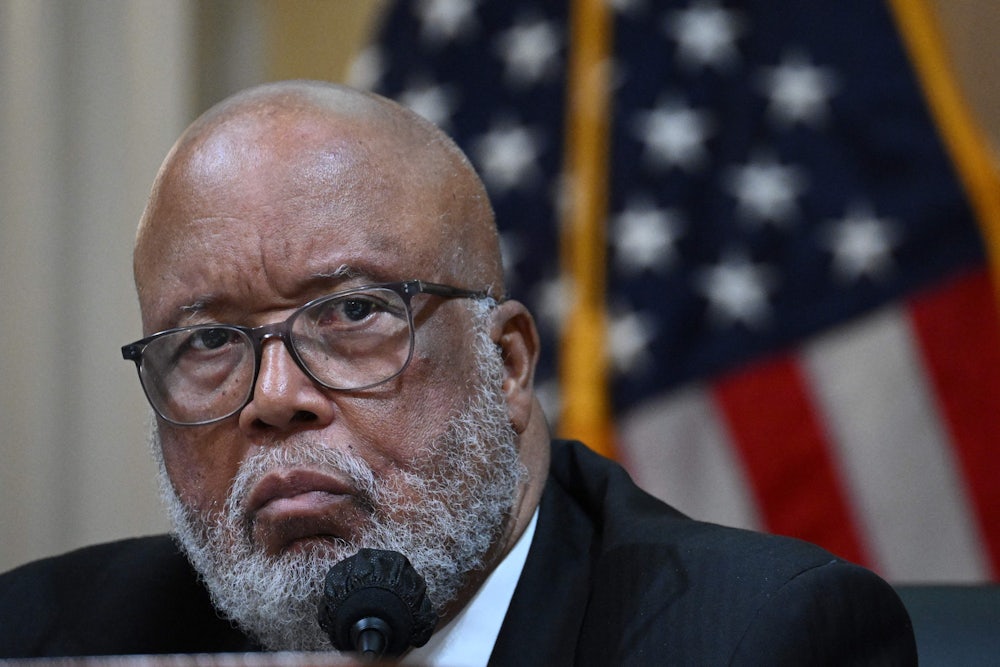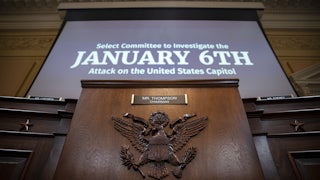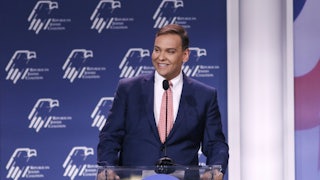The House January 6 committee closed out its final public meeting on Monday by recommending criminal charges against former President Donald Trump for his role in the attack on the Capitol two years ago. Though the committee is also expected to release a full report by the end of this week, the vote will likely be the last significant move by the body before the Republican takeover of the House next month ends its work—a final televised indictment of Trump in the American public memory.
“In the Committee’s hearings, we presented evidence of what ultimately became a multi-part plan to overturn the 2020 Presidential election,” the committee said in the report’s 158-page executive summary, which it released on Monday. “That evidence has led to an overriding and straight-forward conclusion: the central cause of January 6th was one man, former President Donald Trump, who many others followed. None of the events of January 6th would have happened without him.”
When the committee first began its proceedings last year, it received a fair measure of skepticism from observers. There are grounds to criticize it for not moving swiftly enough or decisively enough in some areas. But the committee has still performed a vital public service by thoroughly investigating one of the darkest moments in American history—and by providing a measure of public accountability against those who tried to overthrow the republic nearly two years ago.
The committee’s referral covered four alleged criminal offenses. Obstruction of an official proceeding and conspiracy to defraud the United States both pertain to Trump’s efforts to disrupt the Electoral College count before and on January 6, 2021. Conspiracy to make a false statement addresses his participation in a scheme to organize fake electors to cast voters in his favor for the Electoral College count. The last and most serious charge is for inciting, assisting, and/or providing aid and comfort to an insurrection. That one covers his encouragement of his supporters’ siege of the Capitol building.
Monday’s referrals were by no means a surprise. The committee had telegraphed for months in public hearings and statements that it would allege criminal responsibility by Trump and some of his top allies. In addition to Trump himself, the committee also recommended charges against John Eastman, the conservative lawyer who helped craft Trumpworld’s legal and semi-legal attacks on the election, for his part in the scheme. Eastman’s emails and text messages proved to be some of the most potent evidence of wrongdoing that the committee and others had uncovered.
This was not the first time that the January 6 committee has recommended charges over the past two years. The committee referred former Trump White House chief of staff Mark Meadows and his former deputy Dan Scavino to the Justice Department in April for not complying with the committee’s subpoenas. Federal prosecutors later informed the House that they would not bring charges. A separate referral made against Trump adviser Steve Bannon for defying a subpoena led to his indictment last November.
The January 6 committee does not have the power to bring charges against Trump, nor can the committee (or Congress more generally) prosecute federal crimes itself. The constitutional separation of powers gives that decision to the executive branch, and more specifically, to the Justice Department—which is not obligated to prosecute anyone based on congressional referrals. That decision currently falls to special counsel Jack Smith, who was appointed by Attorney General Merrick Garland to oversee the various Trump-related cases in November, and ultimately to Garland himself. There have been recent signs that the Justice Department is still moving to investigate some things, including the Mar-a-Lago classified documents escapade and Trump’s efforts to pressure Georgia officials into miscounting votes in his favor.
It is still unclear when, how, and if federal charges against Trump might come about. Federal prosecutors typically show more deference to lawmakers’ collective wishes when it comes to offenses like contempt of Congress. But the committee’s referrals are not likely to sway Smith or Garland to make specific charging decisions beyond the evidence and witnesses available to them. Since federal prosecutors almost never discuss cases in public before charges are brought, there is little public insight into when Americans can expect a decision one way or the other.
While the committee lacked hard power, it had no shortage of soft power to wield. Its presentations on January 6 and the events that preceded that fateful day were damning when it came to Trump’s moral and legal culpability for the deadly attack. The Trump era is one of forgetting, of burying things in shame, and of moving on. Through testimony, evidence, and public hearings, the committee has ensured that the country did not simply pick itself up and stumble away from an attempted coup d’état without some kind of reckoning.
This did not persuade Trump’s most devoted supporters to abandon him; perhaps nothing can. That is the wrong threshold. But the committee’s work has arguably helped crystallize in the mainstream American mind that Trumpism is a bloody and treacherous ideology and that its enthusiasts do not belong in public life. That, in turn, may have contributed to Democrats’ better-than-expected performance in this year’s midterms—and to the near-total rout of election deniers for elected office throughout the country.
This is no replacement for more substantive forms of accountability, of course. Ideally it would supplement criminal charges. No sitting or former president has ever been charged with a crime in the nation’s 246-year history, and in the pre-Trump era there was a strong taboo against prosecuting one’s political opponents. If the Justice Department does bring charges, Monday’s referrals will help provide it with a sense of democratic legitimacy and set expectations in the public mind. And if, for whatever reasons, federal prosecutors decline to charge Trump or his closest allies for orchestrating one of the darkest moments in American history, then the committee’s work will at least ensure that their crimes are not simply forgotten.






